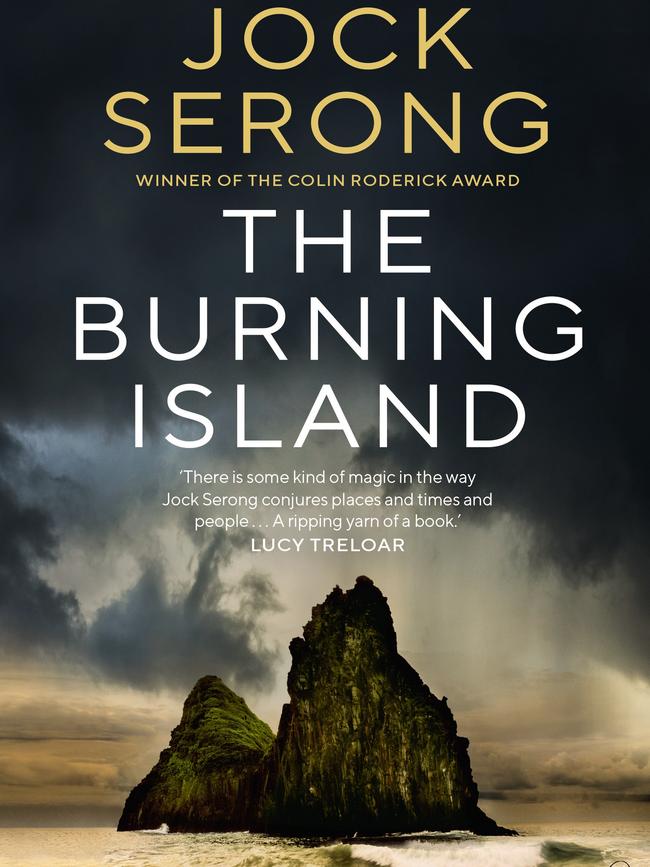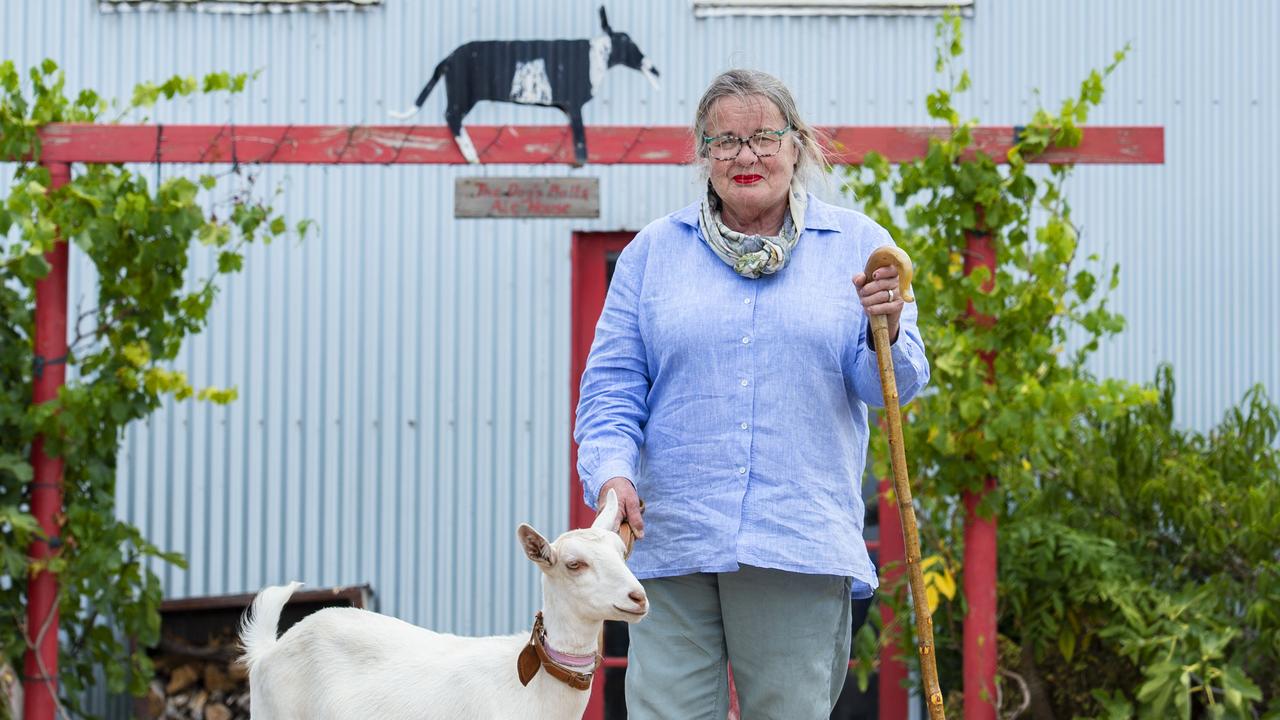Extract from Jock Serong’s new novel The Burning Island
Port Fairy author Jock Serong’s new novel is released on September 1. Read an exclusive extract here.

IN THE evening my father was drunk again, though I hadn’t seen him with a bottle in his hand.
Something was amiss, something was afoot. My long knowledge of his ways told me that he had a hoard somewhere, and I resolved to find it. I waited. I watched him in his phases: buoyant, funny and conversational, then morose. Moving about the deck — even dancing, in the full confidence that he now understood the layout of the boat — before slumping onto his backside and mumbling to himself. He was a drunkard, and a drunkard lives all the rampant madness of our dreams undisguised.
After we’d eaten the evening meal, he finger-traced his way over the timbers and through the rigging until he reached the bow, then propped himself up among the coiled ropes and began a muddled rendition of ‘Spanish Ladies’. I picked up a lantern and went below.
Through the boards I could hear him on the deck. Eventually he would make his way back down to where I was: I had to hurry, but I had to be sure of what I was doing. Argyle was busy with his chart, the doctor with some other dissection. Angus Connolly was snoring in his bunk; Declan above deck on silent watch. My father, meanwhile, had mislaid his lyrical man-o-war somewhere between Ushant and Scilly. There was time.

I began with the small chest at the foot of his cot. Clothing, disarrayed. A razor and brush, his pipe. A brooch: a shell cameo in a delicate gold frame with a relief design of a woman’s face, her hair garlanded with blossoms. I closed my eyes and felt it with a fingertip. I could not, no matter how hard I concentrated, discern the image without sight. But someone who had once had sight would use the fingertip to remember what they saw. Perhaps. The cameo called to me from a well of memory but that moment, whatever it was, hung like a phantom just beyond reach. I raised it to my nostrils but there was only the smell of old metal from the frame.
Another banging sound from above. I needed to hurry.
I plunged deeper among the garments and flinched in shock. My hand had found a blade: had I struck the edge as I’d struck the flat, I would have cut myself deeply. I traced along it in the half-light of the cabin and found the hilt, lifted it out. A dagger nine inches long. Plain and ugly, flecked with rust along its spine, the honed edge bright.
I had heard from many people the tale of how the imposter Figge had stabbed my father. It was embellished by the vulgar with the epilogue that the attack had made me an only child: that the injury was of an unmentionable nature such that he could never again get a woman with child. So here was a weapon of lethal intimacy, a means of mortal violence available to a blind man. A blind man could not shoot, he could not hurl a missile or swing a club, but in close, working by feel, he could slip a blade between a man’s ribs. For my father, who had felt the steel, a moment of vengeance in perfect symmetry.
Sounds on the deck, feet moving quickly. I could no longer hear my father.
The Moonbird lurched hard to port, so hard that I tumbled against the bulkhead and the lid of the sea chest slammed shut, narrowly missing my fingertips.
Voices above me, raised in alarm. A frantic winding of the gear. They had the ship hard over on her port side, straining. I tilted out of the cabin and clawed at the stairway until I was on deck. It was dark all around now. Declan Connolly thundered past me, coils of rope over his shoulder. He saw me, whites of his eyes.
‘Yer damn father’s gone over.’
I was shocked, but also strangely resigned: of course. Of course he’d gone over. The falls, the fights, the broken glass and the cooking accidents: he lived on the edge of calamity at all times. How could I have thought we would travel without incident on the open sea? I ran to the bow and saw we were curving back into the faint white aftermath of our own wake. Our hull was cutting phosphorescence again in the black water, confounding our vision out into the darkness.
The faintest glow of stars out there. Argyle was beside me, wrapped in a dressing-gown and sash, his eyes focused intently on the gloom, counting softly under his breath. Counting down. When he reached zero he called, ‘Spill the mainsail,’ and the brothers complied. The Moonbird surged as the wake caught up with us. Argyle called, ‘Quiet,’ and began counting again, forwards now.
The sounds of the boat’s motion fell away and silence wrapped around us.
Impossible, surely. So much sea out there, and my father so weak. In all likelihood too drunk to call for help. But Argyle was perfectly still, strung like a hunting dog.
‘There.’
He pointed forward, slightly off to our starboard side. I could see nothing.
‘A landing pole or a gaff, perhaps, Declan? But be careful with him, please.’
I followed the direction he had indicated, over the slick dark surface to where it was broken by a tiny shape. Argyle ran to the helm and we veered towards it. As we drew closer I recognised the shape as my father’s back, his body slumped forward so that his face was in the water.
One Connolly went to the port in the gunwale and the brother stood behind him and grabbed a fistful of the trousers between his buttocks so he wouldn’t tumble in. Declan leaned out and swung the pole, and my breath shuddered for fear the hook on its end would sink into my father’s flesh. But when the pole struck his back he did not react.
I thought then that it had been too long, too long. He had no more will in him than the strands of kelp that hung in the water nearby. It would take so little for the sea to finish him off, to leave me finally alone.
Declan began to twist the pole and the hooked end gathered a bunch of shirt. He laid the pole on the hull’s edge and levered the near end down so that my father began to lift clear of the water. Angus was lying in the bay now. He reached forward as my father’s limp form swung in towards the Moonbird and in one swift motion he had a hold of him. He hauled the old man onto the deck.
The water streamed off him and he lay there limp. Again, that crowd of feelings so at odds with each other. The terrible fear of losing him; the end of my central reason for living and, with it, a whisper of curiosity about who I might be now; relief that this mad escapade would end.
The men turned my father over, slid a cask under his belly and began to roll him, pressing on his back and thumping between his shoulderblades. He coughed and vomited: I took a bucket of water and sloshed the mess away. I admit I threw the rest of it over his face, and not because I thought it would rouse him, sodden as he was.
He shook himself, reached vaguely into the air in front of him and bellowed something; then he drew his feet up under himself, tried to stand, then toppled and fell.
The others wandered off, satisfied that the crisis was averted. They brought the Moonbird around to its original course and returned to their assigned positions: Angus and Declan to their hammocks, Argyle to the watch. I asked the master who had raised the alarm: he thought it had been the doctor, now returned below decks.
My father had sat himself up with his chin raised, a posture I knew to mean that he was trying to orientate himself. Relief was curdling to fury inside me.
‘You were very fortunate,’ I said, as evenly as I could.
He heard the anger beneath my words. Looked pained for a second, confused. ‘I don’t know how I fell in...’
‘I’ll tell you how: you were rinsed! Where is the grog you’re carrying? I’m going to put an end to it.’
Confusion again.
‘I’m not carrying any grog, love. Just, just stay true to it, I beg you. We...find the man an then we’ll, then we’ll...’ He slumped, retched, vomited again.
I turned away. Declan had roped off the gunwale bay: he couldn’t go anywhere; it wasn’t cold above decks. I decided he could spend some time reflecting on his idiocy.
I stormed down into the hold where the brothers were snoring in their hammocks. The provisions were kept in large wooden crates, roped down and braced between the ribs, and divided into their various purposes: dry stores, fruit and vegetables, water. I pawed through them all until I found what I was looking for: a few small crates of bottles and two casks. The noise of my search must have woken the convicts, because I could hear their exchange in the darkness behind me.
‘What’s she doin, Dec?’
‘Ah, Christ a’mighty, the booze.’
They were powerless to intervene but they cursed me loud enough to ensure I’d hear. I took a crate and struggled up the stairway with it in my arms, banging on every step. When I got onto the deck I staggered to the rail and heaved it into the sea. Past my father, who did not miss the tell-tale clinking and splashing.
He turned his face my way, muttered the usual tired refrain about the serpent’s tooth.
‘We’re not going back for that,’ I spat.
I went back to the hold and repeated the process until I had removed every bottle I could find. The liar! Of course we were carrying booze. I watched the casks bob away into the darkness, took out some of the individual bottles and flung them as hard as I could, aiming them at the bobbing casks. It felt satisfying, as if I had lanced something that afflicted both my father and me.
He resorted to that stage of his bingeing that I knew well, sitting there mournfully on the deck, a blanket around his shoulders now, berating me. The waste! The waste! I had no idea about life at sea. I was a harpy, a shrew. This (whatever it was) is what happens when you take women to sea. My mother would be turning in her grave, oh, mark my words.
He didn’t seem to be flagging, which was a worry. Normally by this stage he’d have woe-betided himself to sleep.
The frustration overtook me and I screamed, or shouted, I don’t know, somewhere close to his face. It was the piling-up of everything: the ingratitude, the obstinacy, the insults, all of it. And for just a brief instant I thought I’d discharged the accumulated rancour. But his reaction robbed me of even that small pleasure. His expression shifted rapidly from bafflement to distress and he lowered his head.
‘How many times,’ I asked him. ‘How many times must we re-enact this? Does it just go on this way until we both flag out and die?’
‘Oh what, what? There is no re-enactment.’ He swept his hands across the boards of the deck as though he wanted to draw a moat around himself. ‘This is my life now, this is yours. No love in it. God’s abandoned us and here we are.’
I had been standing above him, though he would only have known it by the direction of my voice. Now I sat down at his side, suddenly exhausted. The words escaped me quietly. ‘I do love you. I have always loved you.’
We sat like that and neither of us spoke. The boat slipped onward, closing in towards something we couldn’t understand. The dark birds moved about us, specks of cold water lit on our faces, perhaps spray or the faintest rain, drips off the rigging, and here we were, two lost people on a voyage to nowhere.
— The Burning Island, by Jock Serong, is available September 1. Published by Text Publishing. RRP $32.99
MORE
LION AND MENGNIU SCRAP DAIRY DEAL


